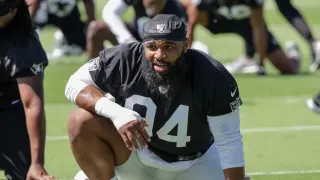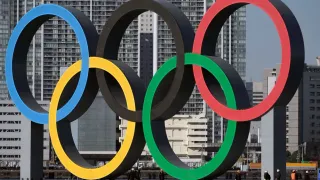July 15, 2022
Character Witnesses Lend Support in Trial of Out WNBA Star Brittney Griner
Jim Heintz READ TIME: 3 MIN.
Brittney Griner's drug possession trial resumed Thursday with the head of the Russian club she plays for in the offseason and a teammate from that squad testifying in support of her character and what the WNBA star has meant for women's basketball in the country.
Griner, who pleaded guilty last week, did not testify as expected at the third day of the trial. She has been detained in Russia since February, and the U.S. government is under pressure at home to do more to secure her freedom. Her guilty plea could be an effort to expedite the court proceedings so any negotiations about a prisoner exchange could move forward.
Griner was arrested at the Russian capital's Sheremetyevo Airport when customs officials said they found vape canisters with cannabis oil in her luggage. She acknowledged in court that she possessed the canisters, but said she had no criminal intent and said their presence in her luggage was due to hasty packing. She is facing up to 10 years in prison.
In Russia's judicial system, admitting guilt doesn't automatically end a trial
Most journalists were denied access to Thursday's session, but the director of UMMC Ekaterinburg, for which she plays during the WNBA offseason, told reporters afterward that he testified as a character witness.
"Our task today was to tell the court about her characteristics as an athlete, as a person – tell about how she played a big role in the success of the Ekaterinburg club and Russian women's basketball as a whole," club director Maxim Rybakov.
"Today is the first day when we have seen our basketball player since February. Thank God, she feels well, looks good," Rybakov said outside the courthouse in the Moscow suburb of Khimki, where the airport is located.
Player Evgenia Belyakova said she testified that "Brittney has always been a very good teammate, so my role here is just to be with her, to support her."
"We miss her very much, we miss her energy," Belyakova added. "I was very happy to see her, and I hope this trial will be over soon and with a positive outcome."
Also in court were Elizabeth Rood, charge d'affaires of the U.S. Embassy in Moscow, and other consular officials, and they were able to speak to Griner, who told them she appreciated their presence, the U.S. State Department said.
The trial's next session is set for Friday.
Griner is one of the most prominent female athletes in the U.S., a standout for the Phoenix Mercury and a two-time Olympic gold medalist.
U.S. President Joe Biden and Secretary of State Antony Blinken have said they were doing all they could to win her release, as well as that of other Americans the U.S. considers "wrongly detained" by Russia, including former Marine Paul Whelan.
Washington may have little leverage with Moscow, though, because of strong animosity over its military operation in Ukraine.
Russian media have speculated that Griner could be swapped for Russian arms trader Viktor Bout, nicknamed "the Merchant of Death," who is serving a 25-year sentence in the U.S. after being convicted of conspiracy to kill U.S. citizens and providing aid to a terrorist organization.
Russia has agitated for Bout's release for years. But the wide discrepancy in the seriousness of their cases could make such a trade unpalatable to Washington. Others have suggested that Griner could be traded along with Whelan, who is serving 16 years in Russia on an espionage conviction that the U.S. has described as a setup.
The State Department's designation of Griner as wrongfully detained moves her case under the supervision of its special presidential envoy for hostage affairs, effectively the government's chief hostage negotiator. The classification has irritated Russia.
Asked about the possibility of Griner being swapped for a Russian jailed in the U.S., Deputy Foreign Minister Sergei Ryabkov, the senior Russian diplomat, has noted that until her trial is over "there are no formal or procedural reasons to talk about any further steps."
Ryabkov warned that U.S. criticism, including the description of Griner as wrongfully detained and dismissive comments about the Russian judicial system, "makes it difficult to engage in detailed discussion of any possible exchanges."
Griner's detention has been authorized through Dec. 20, suggesting the trial could last months. Griner's lawyers, however, said they expect it to conclude around the beginning of August.







